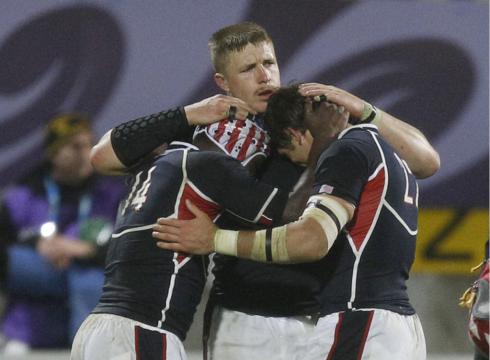
RWU HQ – After a fortnight of anticipation, I am pleased to bring you our latest RWU Rugby Q&A, this one with USA Eagles lock/loosie Lou Stanfill. Here it is: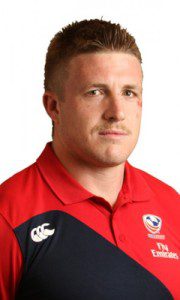
Q: Great to have you, Lou. Much appreciated.
A: My pleasure, DJ.
Q: What made you first decide to play rugby at Sacramento Jesuit in high school? I heard there’s this story about a lost baseball glove story that started the Stanfill brothers rugby dynasty. True?
A: 100% true. I lost my mitt during PE class my first semester at Jesuit and my springs were dominated by baseball – in which I was losing interest. Rugby struck my curiosity because it was a contact sport and that was right in my wheelhouse. It was much easier to tell my father that I wanted to play rugby rather than admit that I lost my baseball mitt. When I told my dad that I wanted to play rugby, he was not entirely happy with my decision as we had invested a lot of time in developing my baseball skills. After the first game, he was hooked and we never looked back. Five years later, I told him about my mitt and he laughed, which was much easier to deal with than if I told him when I was younger! I never looked back, but I do miss that baseball mitt…
Q: You found success in rugby early in your career while playing at Sacramento Jesuit, leading your team to a national semifinal appearance. What were some of the lessons that you learned along that ride that have helped you later on in your rugby career?
A: Besides learning the basics, the most important lesson I learned as a young rugby player at Jesuit was knowing what type of player I was. I tried to do the flashy skills early on, but I quickly learned that I was much better as a hard nosed, do-the-dirty-work kind of player. That helped me to improve my game immensely.
Q: Jesuit has been the best high school team in the US over the past decade and has produced numerous Eagles. What is it about Jesuit that makes them so successful and how could other high schools emulate this?
A: Jesuit has built a successful program through the coaching and culture it has kept. The coaches drilled the fundamentals on a daily basis. Players were expected to be respectful on the field and play the game within the laws of the games. And all players were fielded based on merit. No one player was better or above another based on social status, potential or athletic prowess… however, everyone played. Anyone who attended practice and worked hard earned playing time. I recently went back to Jesuit and helped out with a training session and, much to my pleasure, nothing has changed.
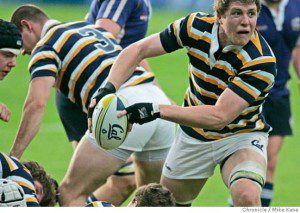 Q: You were also a pretty good football player in high school, being named the Sacramento Defensive Player of the Year. Did you ever think about furthering your career in football and not rugby?
Q: You were also a pretty good football player in high school, being named the Sacramento Defensive Player of the Year. Did you ever think about furthering your career in football and not rugby?
A: I was offered a walk-on spot on the Cal [University of California Berkeley] football team, but I decided to keep my focus on rugby. I witnessed how time consuming football was to those who played and it would be disadvantageous to try to play both sports. This paid off, as I earned my first cap after my second year at Cal.
Q: What was the deciding factor to enroll there? Was it because it was close to home?
A: Going to Cal was actually my back-up plan. My hope was to land a football scholarship, but that dream was not achieved. Not a bad back-up plan if I do say so myself!
Q: At Cal you found a lot of success, winning a few national championships. What are some of the lessons you’ve taken away from each of those experiences? What was different about each one?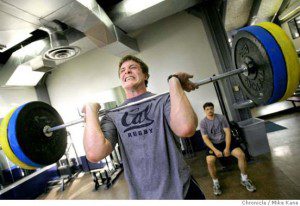
A: Each national championship was its own challenge; some monumental and some a little less daunting, but each year was about constant performance improvement. We were a team who strove for excellence and demanded more of ourselves and when we underperformed. By far, the final of 2006 against [Brigham Young University] was the most challenging… and most rewarding win of them all.
Q: You were also selected as an All-American, what did an honor like that feel like?
A: Representing the All-Americans was a tremendous honor, as many before me wore the shield on their chest with honor. To represent it overseas was an opportunity never to pass up.
Q: When you weren’t on the pitch or weight room during your time at Berkeley, what did you do with your free time?
A: When I wasn’t on the field or in the gym, I was in my books. Being the top public university in America, I spent much time in my studies, graduating with a degree in American Studies which included a 30 page thesis. I also held a number of jobs so that I could have a little money in my pocket and afford some nice boots!
Q: Impressive… What were some of the memories you took from your times in college?
A: I have a wealth of experiences and lessons from my time at Berkeley, some easy to learn and some difficult. But above all else, the friendships I made and the men in which I made these memories, I take with me no matter where rugby takes me.
Q: Rugby has taken you everywhere, from Australia to Italy, what are some of your favorite places you visited while playing rugby?
A: Playing in Aspen and living with the American legend that is Alec Parker is quite the memory I have. The field in Aspen is one of the most picturesque places to play rugby in the world. It is hard to say what is the best memory, but playing with the Olympic Club on Treasure Island in SF were always great days. But in Italy… Oh, Italy… were some of the prettiest, most history-rich cities I have visited. I am American, through and through, but I like to think there’s a little Italian in me as well.
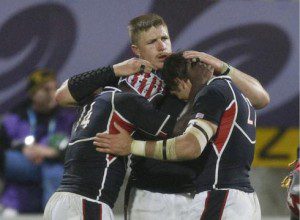 Q: You became the third-youngest player for the Eagles when you made your debut at the International Level at the Toshiba Super Cup in Tokyo, against Canada on May 25, 2005. Can you describe to me what that day was like?
Q: You became the third-youngest player for the Eagles when you made your debut at the International Level at the Toshiba Super Cup in Tokyo, against Canada on May 25, 2005. Can you describe to me what that day was like?
A: The day I received my first cap was a very interesting day. Before I got capped, I was filled with nerves and forced feeling of confidence (by my own doing), but it made it nonetheless amazing. Though I didn’t last all game (injured in the 39′), my first cap was alongside Todd Clever, Mike Palefau, Mike MacDonald, Albert Tuipulotu, Chris Ostentowski and Tasi Mounga. These are the guys who showed me what it meant to be an Eagle.
Q: What would you say is different about your game in 2005 and now?
A: The team is undoubtedly different now, and for the better. We have worked hard to create a culture we can call American and produce a style of rugby of which we are proud. It has been a long, up-hill battle, but as Jack Clark says, “If you’re not getting better, you’re getting worse.”
Q: In 2012 you won the Super League Championship with New York Athletic Club. What’s different from that experience to your championship days at Cal?
A: The difference between winning the Super League title in 2012 and National Championship in college is that the collegiate national championships were a lower standard of rugby. That final in the Super League was a difficult game of us at NYAC to win on the road, and the group that won it were hard-nosed men who wouldn’t accept defeat. We had men like that at Cal, but element of accountability changed when you are working for a living as opposed to being a student. When you have bills to pay, it is very difficult to make rugby a top priority.
Q: Did your time at NYAC always put you in a New York State of mind?
A: Thinking about my time at NYAC certainly puts me back in the New York groove.
Q: You’re currently playing for Seattle OPSB Rugby Football Club, what has that experience been like?
A: Playing at Seattle OPSB has been an overall positive experience. As I get older, I realize that my position within a team is as involved as I want to be. The greatest lessons I learned at Berkeley were about leadership, and the best and simplest definition of which is: “A leader makes those around him/her better and more productive.” We work together on and off the field thanks to the Serevi Rugby Institute and it has given me a great chance to exhibit my own leadership qualities. We have a great group who want to get better everyday, and being surrounded by that makes pushing oneself that much easier and more important.
Q: As for Team USA, you seemed to be a vocal leader in the second leg of the Uruguay series. Did Tolkin, or anyone else on the coaching staff, pull you aside and ask you to step forward, or did you step forward on your own?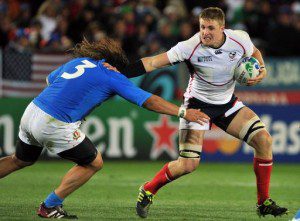
A: No, I took that role on myself. It was a bit of trial and error in figuring out what to say and how to say it and whether it works or not. I feel that the other members of the Eagles respect me, and that makes it easy to speak to everyone. We are cultivating a team built around respect and letting your play do the talking. In that culture, everyone has the chance to be a leader and we have a team full of them.
Q: No one really likes to lock but it is an important position. As a guy that plays backrow for club and lock for your country do you have a preference? Would like to get more time at backrow for the Eagles? Or is it just whatever will get you playtime?
A: My skill set has become more in tuned with that of lock, so I am happy to get my head stuck in it and do the work that is required of me. I relish the challenges that come from that and feel that my game has grown because of it.
Q: Sacramento is considered by many to be the spiritual home of rugby in the US. How excited are you to play there in front of family and friends?
A: International rugby coming to Sacramento has been a long time coming. It means the world to me to have the chance to play in front of my hometown. Sacramento deserves this and it won’t be the last time we play there.
Q: Taking a step back from rugby for a moment… If you could describe yourself in one word what would it be?
A: One word to describe myself??? I don’t much care for questions like these, but I guess it would be “happy.” Gotta ask someone else for a better answer, I suppose.
Q: If you could play on one reality TV show, what would it be?
A: I don’t watch much reality TV, but I’ve always enjoyed nature shows. Anything narrated by David Attenborough is a 10 in my book, so being on set for one of his shows would rock. But for giggles, let’s just say “Joes vs Pros“. I’d be a Joe…
Q: Finally, why do you continue to play rugby?
A: I keep playing rugby for many reasons. Some are tangible, like the guys I play with and bleed alongside on the field. Others are intangible, like this feeling inside myself that just cannot reason hanging up my boots at a young age, no matter how bad my bank account looks or how far behind my peer group I feel. I know I am chasing a dream that I set out for long ago. And in the chase, I have made memories that no amount of money can buy. The opportunity to put on your country’s colors at a men’s senior level is an honor that no job or pay check can compare. Add that to a sense of fulfillment of my own potential, and you understand why someone like me continues to play. At the core, it is because I love the game with all my heart, and quitting while there is still fight in me is not acceptable.
Q: Great answer. Thanks, Lou.
A: Thank you.

